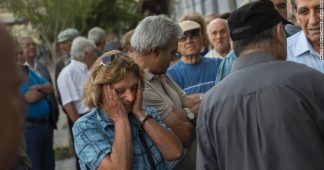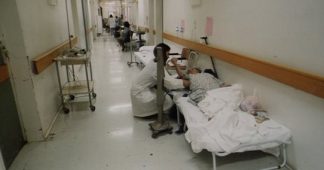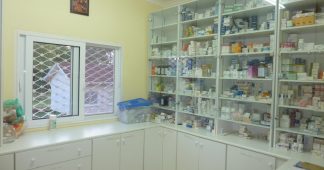The economic crisis and the strict austerity bound to the loan agreement kill. They kill Greeks. The Bank of Greece may not write it in such a melodramatic way on its Monetary Policy Report 2015-2016. However, the conclusions in the chapter about “Reforms in health, economic crisis and impact on the health of population” are shocking and confirm what we have been hearing and reading around from relatives and friends in the last years: that the physical and mental health of Greeks has been deteriorating – partly due to economic insecurity, high unemployment, job insecurity, income decrease and constant exposure to stress. Partly also due to economic problems that have patients cut their treatment, partly due to the incredible cuts and shortages in the public health system.
The Report notes that “while it takes longer to record the exact effect, trends show a deterioration of the health of Greeks in the years of loan agreements and austerity cuts.”
The BoG states:
– Suicides increased. “The risk of suicidal behavior increases when there are so-called primary risk factors (psychiatric-medical conditions), while the secondary factors (economic situation) and tertiary factors (age, gender) affects the risk of suicide, but only if primary risk factors pre-exist.
– Infant mortality increased by nearly 50%, mainly due to increase of deaths of infants younger than one year, and the decline of births by 22,1%. Infant mortality increase: 2.65% in 2008 and 3.75% in 2014
– Increase of parts of population with mental illness, especially with depression. Increase: 3.,3% in 2008 to 6.8% in 2009, to 8.2% in 2011 and to 12.3% in 2013. In 2014, a 4.7% of the population above 15 years old declared it suffered form depression – that was 2.6% in 2009.
-Increase of chronic diseases increased by approximately 24%.
The BoG notes that “the large cuts in public expenditure have not been accompanied by changes and improvement of the health system in order to limit the consequences for the weakest citizens and vulnerable groups of the society.”
The report of the Governor of the Bank of Greece reckons surveys conducted by Greek Statistic Authorities (ELSTAT) and according to which:
- a significant increase of 24.2% of people aged 15+ suffering from chronic health problem or chronic disease.
- increase of more than 15% of people who limited their activities due to health problems in 2014.
percentage of low-weight (below 2.5 kg) births increased by 19% in 2008-2010, and that this is associated with long-term negative effects on the health and the development of children.
Citing OECD data of 2013, the BoG underlines that 79% of the population in Greece was not covered with insurance and therefore without medical and medicine due to long-term unemployment, while self-employed could not afford to pay their social contributions.
A survey conducted in 2014 by ELSTAT showed that part of population above 15 years old was in need of medical help but did not receive it due to lack of financial means:
13% of population did not receive medical care or treatment
15.4% of population did not receive dental care of treatment
4.3% of population did not receive mental health care services
11.2% did not take the prescription medicine prescribed by doctors.
The same survey shows a decrease in private hospital admissions and increase in public hospital with the effect that public hospitals are not able to cope with the increase demands due to austerity budget and personnel cuts. Public hospital admission in 2009 were 1.6 million, and 2.5 million in 2014.
According to the survey, percentage of population that needed to receive medical-nursing care and received it in delay or not at all was:
13.1% due to long waiting list
6.1% due to long distance or transportation problems
9.4% due to lack of specialized doctors and health personnel.
The BoG report warns that the economic crisis and the devaluation of the health sector threaten to shrink the life-expectancy. Everyone who lives in Greece knows very well the drug with the long waiting lists in to get an appointment for an medical examination or a diagnostic checks in public hospitals. In some cases the next appoint for a simple check may take up to a year. Due to merging of hospitals and primary health centers, people may need to travel even 120 km to find the doctor they need. Just a couple of days ago, KTG posted about the dramatic situation in Ierapetra town in south Crete and the people in their despair would rather seek the help of a local veterinarian than a doctor for humans.
However, the crisis does not affect the patients only. It affects the health personnel as well. It was just two days ago, when a friend of mine, a doctor specialized in vascular diseases was telling me that while he was always keeping the necessary distance to patients he has started to be affected because people are really suffering due to the economic crisis. “There is a lot of drama out there, and I cannot close my eyes to it.” he said.
One of the neighborhood pharmacists has been telling me on and off about the dramatic number of patients who cannot afford the self-participation in prescription medicine. Many of his clients cut their treatment into half – like 1 tablet for cholesterol not daily but every other day basis – and that some have given up the whole treatment. “For some people the choice is: either have treatment or food.”
And this has been going on since 2012, when then Greek Health Minister adopted the German model of “self-participation in prescription medicine, laboratory tests” and cut some primary health services but forgot to adopt also that aspect of the German model that provides that patients would not spend more than 2% of their income for medical services and medication.
But I’ve written many times about this in the past, haven’t I? I thought to give a break to the “Greek drama” but reality is stronger than the blogger’s wishes and plans.











